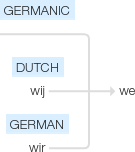We
Old English, of Germanic origin; related to Dutch wij and German wir .
wiktionary
From Middle English we, from Old English wē(“we”), from Proto-West Germanic *wiʀ, from Proto-Germanic *wīz, *wiz(“we”), from Proto-Indo-European *wéy(“we (plural)”). Cognate with Scots wee, we(“we”), North Frisian we(“we”), West Frisian wy(“we”), Low German wi(“we”), Dutch we, wij(“we”), German wir(“we”), Danish, Swedish and Norwegian vi(“we”), Icelandic vér, við(“we”), Avestan 𐬬𐬀𐬉𐬨 (vaēm), Sanskrit वयम्(vayám).
etymonline
we (pron.)
Old English we, first person plural pronoun, "I and another or others," from Proto-Germanic *wejes (source also of Old Saxon wi, Old Norse ver, Danish vi, Old Frisian wi, Dutch wij, Old High German and German wir, Gothic weis "we"), from PIE *we- (source also of Sanskrit vayam, Old Persian vayam, Hittite wesh "we," Old Church Slavonic ve "we two," Lithuanian vedu "we two").
The "royal we" (use of plural pronoun to denote oneself) is at least as old as "Beowulf" (c.725); use by writers to establish an impersonal style is also from Old English; it was especially common 19c. in unsigned editorials, to suggest staff consensus, and was lampooned as such at least since 1853 (see wegotism).
